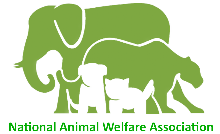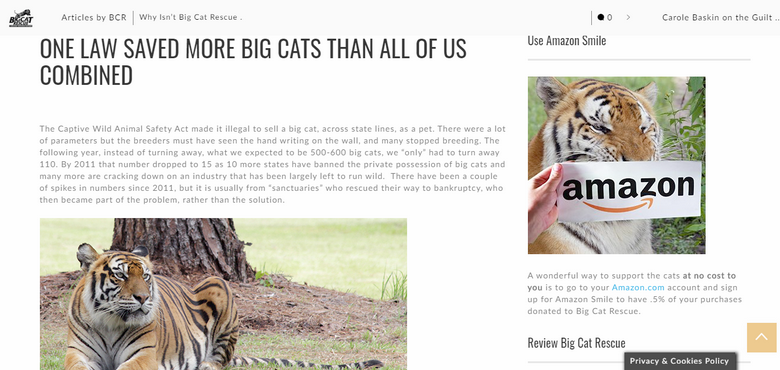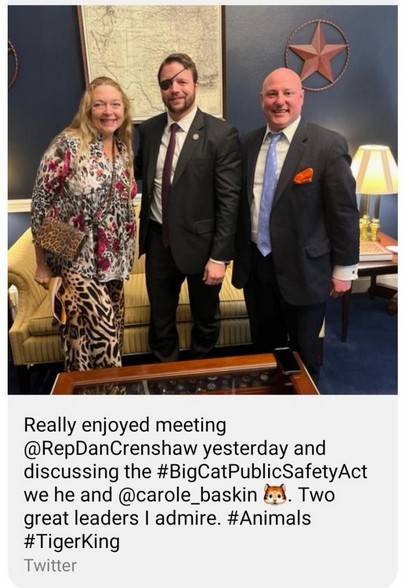- ACTION ALERT: Say NO to the deceptively named “Big Cat Public Safety Act”
Published by -NAWA News Feed- in - ACTION ALERTS - · Saturday 18 Dec 2021
Carole Baskin riding the release of “Tiger King 2" to push her special
interest, the deceptively named “Big Cat Public Safety Act”, attempting
to dupe Congressman Dan Crenshaw.
Take the “Quick-Action” and tell Congressman Dan Crenshaw [R-TX] not to
fall for this propaganda.
On January 11, 2021 the Big Cat Public Safety Act (H.R. 263 and SB 1210) was introduced into the U.S. House of Representatives. Proponents of these bills laud it as a bi-partisan effort to “prohibit private ownership of captive lions, tigers, and other big cats in the US.” — in other words, pets.
The main author of this bill is none other that Rep. Mike Quigley [D-IL], the who is on the Chair of the Association of Zoos and Aquariums, (AZA). However, this characterization appears not only disingenuous, but it is duplicative, as most states already prohibit the ownership of big cats as pets. If passed as written, the primary impact of these bills would not be on pet owners, but on zoos and sanctuaries that are not ideologically aligned with animal rights advocates espousing historical anti-captive wildlife sentiments.
All but two states have bans or regulations that tightly control such ownership, in addition:
- No uninvolved member of the public has been seriously injured by an escaped exotic cat in the last decade.
- No uninvolved person has been killed by an escaped exotic cat in the last 25 years, and this time span probably extends much further.
Carole Basking taunting that after the passage of the Captive Wild Animal Safety Act, there is no more problems with private ownership - except for “other sanctuaries”
Usurping the Animal Welfare Act
In a joint press release animal rights groups claim this bill would strengthen the Captive Wildlife Safety Act (CWSA). The CWSA is the 2003 Lacey Act amendment mandating interstate transport of big cats be limited to facilities licensed by the U.S. Department of Agriculture (USDA) and their registered agents. This amendment was consistent with the primary directive of the Lacey Act— to combat “trafficking” in “illegal” wildlife.
The Lacey Act was never intended to regulate animal welfare. That is the dominion of the Animal Welfare Act (AWA). However, this bill seeks to expand the authority of the Lacey Act empowering U.S. Fish and Wildlife Service (FWS) to regulate “animal welfare” and “legal” wildlife; points of law already established under the AWA, and administered by USDA through the licensing and inspection of qualified facilities.
Dan Ashe, former Director of FWS under the Obama Administration and current CEO of the AZA, has long maintained working relationships with animal rights proponents of the Big Cat Public Safety Act, particularly with the Humane Society of the United States (HSUS), as well as the International Fund for Animal Welfare (IFAW).
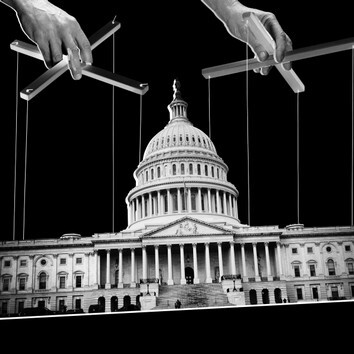
Five previous iterations of these bills have been shopped around Capitol Hill since at least 2012. While touting public safety concerns, all have failed to get even a hearing because they are transparent attempts to establish the inequitable ideology of animal rights into the law. Previous versions of the Big Cat Public Safety Act offered an exemption to zoological facilities accredited only by the Association of Zoos and Aquariums (AZA), a trade association favored by bill proponents for instituting animal rights policies into their accreditation. These same proponents, led by the Humane Society of the United States (HSUS), have been engaged in an ongoing smear campaign against any zoo or aquarium not accredited by the AZA.
These bills would continue to favor AZA, although no longer exempting them by name. The exemption is accomplished through a bit of “slight of hand,” calling for a USDA exemption, but then qualifying the exemption with a laundry list of AZA/HSUS negotiated policies inserted into the bill language.
These qualifications effectively usurp authority from the AWA, placing it under the authority of the Lacey Act.
By writing animal rights policy into the Lacey Act, these bills seeks to rewrite a broad swath of USDA animal welfare regulations by doing an end run around the AWA. These animal rights groups hope to supersede USDA regulations they were unsuccessful in changing through the administrative process by pushing legislation at the House Natural Resources Committee with lawmakers unfamiliar with animal welfare issues. If these bills were to pass as written, FWS, without any experience regulating captive wildlife, would administer and enforce the new regulations.
H.R. 263- S.B. 1210 : Big Cat Public Safety Act:
Section 3 Prohibitions, (e) Captive Wildlife Offense, (2) Limitation on Application, paragraph (1)(A), subparagraphs i, ii, iii, iv, v, vi, vii and viii, presumes to rewrite and supersede an area of established law pertaining to the “animal welfare” of “legal” wildlife already regulated by USDA under authority of the Animal Welfare Act, while maintaining a de facto exemption for AZA zoos.
Public Safety or Animal Rights?
Proponents of these bills cite an incident in Zanesville, Ohio in 2011 as an example of why this bill is needed. However, while tragic, Ohio recently past legislation addressing the issues. Most states already strictly regulate the possession of big cats. South Carolina just passed a ban on big cats as pets in this legislative session.
Ironically, most of the accidents with big cats, lethal and otherwise, have occurred at AZA zoos that would be exempted from this legislation; most notably, San Francisco Zoo in 2007 when a tiger killed a patron and injured two others— and more recently, Palm Beach Zoo in 2016 when a tiger killed a zookeeper. There are only a small handful of states that don’t strictly regulate big cats. Ohio now has some of the strictest regulations in the country. Outside of AZA accredited facilities, a death from a big cat hasn’t been recorded since 2003.
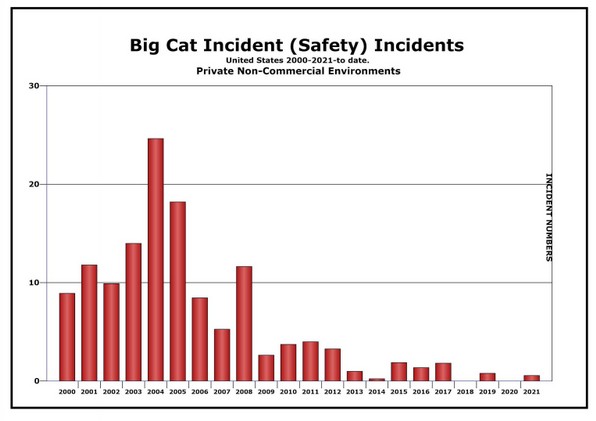
Decline of big cat incidents - current regulations working well.
At the end of the day, animal welfare is not under the purview of the Lacey Act. The Lacey Act was designed to address wildlife trafficking. Further, FWS is not equipped to administer animal welfare regulations. Undoubtedly, funding for this unprecedented and duplicative overreach will be difficult to appropriate under the current administration. Proponents of the Big Cat Public Safety Act have misled bill sponsors and committee members. There is no crisis looming. The Big Cat Public Safety Act is not about public safety. It is about picking favorites and eliminating zoos and aquariums that will not voluntarily adopt the policies of the animal rights movement.
Compromise?
With the help of Dan Ashe and the AZA, HSUS and IFAW are attempting to build political support for a hearing with these bills before the U.S. House Natural Resources Committee. After years of failure petitioning USDA to institutionalize their ideology under the guise of public safety, these animal rights groups hope to have success by changing their tact and selling their brand of “public safety” to lawmakers at Natural Resources unfamiliar with animal welfare issues.

Dan Ashe
CEO, Association of Zoos and Aquariums, (AZA)
If proponents truly wanted only to stop pet ownership of big cats, the solution would be quite simple— amend these bills with a straight forward USDA exemption— without all of the qualifications that make it a de facto AZA exemption. The fact is, the USDA already regulates all legitimate zoos and aquariums regardless of trade association affiliation. Requiring USDA licensing would end the practice of keeping big cats as pets and legitimate non-AZA zoos would not be penalized or coerced into a choice between trade associations. Additionally, this compromise avoids using the Lacey Act to usurp the integrity of the Animal Welfare Act. Without an equitable amendment, zoos and aquariums across the country will likely oppose the Big Cat Public Safety Act.
It's fast and simply !
Use the pre-made letter or edit your own!
